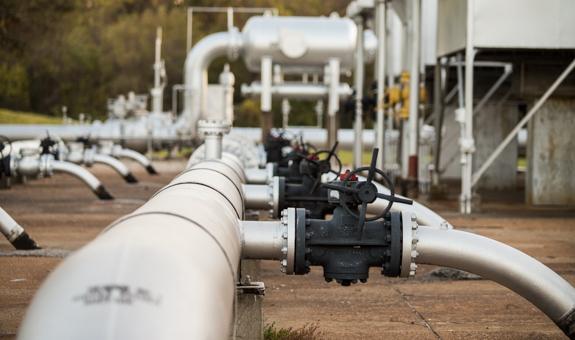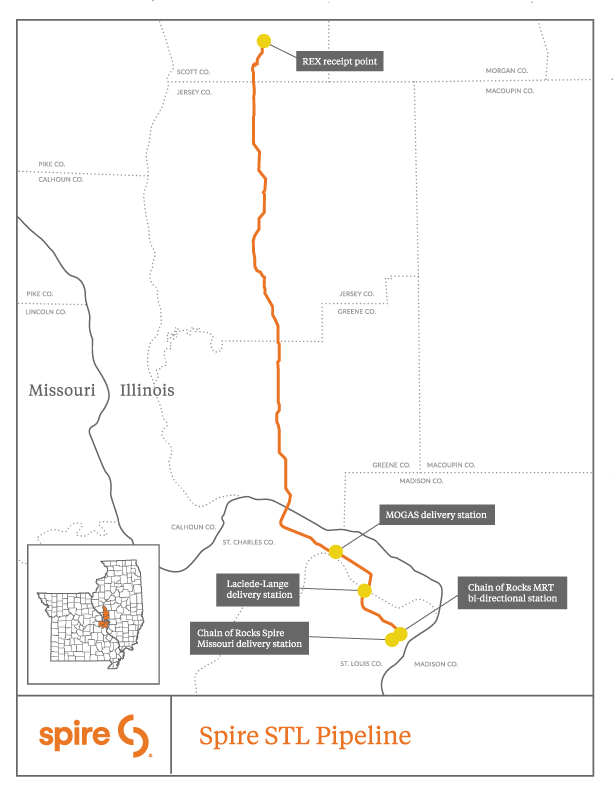Spire STL Gas Pipeline Project Backed by FERC Following Legal Woes
By Mary Holcomb, Digital Editor
(P&GJ) — The Spire STL Pipeline has been reissued a permanent certificate by FERC to operate the 65-mile (105-km) natural gas system, stating the project sufficiently satisfies economic needs in the St. Louis region.
The permanent certificate was approved by the FERC during a Dec. 16 agency meeting. This marks the fourth time the FERC has issued an operational certificate for the Spire STL Pipeline, in each instance determining the pipeline is necessary.
"There was substantial evidence in the record to confirm that the pipeline has delivered strong performance, reduced costs and improved natural gas reliability across the St. Louis region – even during severe weather challenges like Winter Storm Uri in 2021," Scott Smith, president of the Spire STL Pipeline, said.
RELATED: St. Louis Natural Gas Pipeline in Jeopardy After SCOTUS Rejection
In April 2022, Spire asked the U.S. Supreme Court to recall the mandate that struck down the pipeline’s authorization, however the court rejected Spire’s appeal without comment.
The closure of the 65-mile (105-km) pipeline —which has operated since 2019 — would impact the roughly 650,000 customers it delivers natural gas to in the St. Louis region.
The pipeline has been operating under an emergency temporary certificate since August 2021, after FERC’s 2018 permit for the pipeline was revoked and remanded.
"Customers in the St. Louis area currently have the lowest gas costs across Missouri, with the Spire STL Pipeline playing a huge role in keeping costs more affordable," Scott Carter, Spire Missouri president, said. "This certificate provides long-term assurance that Missourians will continue having access to the reliable, affordable energy they need."
The pipeline had been operating under a temporary certificate issued by the FERC on Dec. 3, 2021. That certificate allowed the agency to review the project on remand as ordered by the U.S. Court of Appeals for the District of Columbia Circuit (DC Circuit).
In November 2021, Spire STL Pipeline presented expert reports demonstrating the importance of the pipeline for reliability and cost-saving purposes. These reports also illustrated that the continued operation of this pipeline would not result in significant adverse environmental or environmental justice impacts.
In October, FERC staff issued its final Environmental Impact Statement, agreeing that environmental or environmental justice impacts from the continued operation of the pipeline would be "less than significant."
Additionally, in May, the Missouri Public Service Commission staff report concluded that Spire Missouri's decision to enter a contract with Spire STL Pipeline was prudent.
The new permanent certificate – issued under Section 7(c) of the Natural Gas Act – is effective after Spire STL Pipeline accepts the Certificate order which will be filed with FERC in the coming days.
"We had always believed, once FERC was able to conduct a comprehensive review of the record evidence, that FERC would find a critical need to keep this important infrastructure in service," Smith said. "We cooperated with the FERC and other stakeholders to ensure they had the information needed to inform their analysis. We are grateful they have concluded that a critical need for the Spire STL Pipeline exists, and importantly, we remain committed to fulfilling all our land restoration obligations."
Related News
Related News

- Keystone Oil Pipeline Resumes Operations After Temporary Shutdown
- Freeport LNG Plant Runs Near Zero Consumption for Fifth Day
- Biden Administration Buys Oil for Emergency Reserve Above Target Price
- Mexico Seizes Air Liquide's Hydrogen Plant at Pemex Refinery
- Enbridge to Invest $500 Million in Pipeline Assets, Including Expansion of 850-Mile Gray Oak Pipeline
- Enbridge Receives Approval to Begin Service on Louisiana Venice Gas Pipeline Project
- U.S. to Acquire 3 Million Barrels of Oil for Emergency Reserve in September
- AG&P LNG Acquires 49% Stake in Vietnam's Cai Mep LNG Terminal
- BP's Carbon Emissions Increase in 2023, Ending Decline Since 2019
- Texas Sues EPA Over Methane Emission Rules for Oil and Gas Sector






Comments